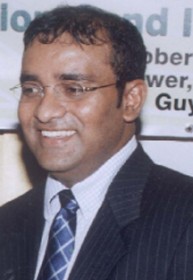President Bharrat Jagdeo has ordered the state-owned National Communications Network (NCN) to cease broadcasting on Channel 21 in Berbice which he said was done without his knowledge.

Office of the President Press and Publicity Officer Kwame McCoy told Stabroek News last evening that the President had ordered NCN to discontinue the broadcast on the second channel with immediate effect. According to McCoy, Jagdeo, who holds the portfolio as the Minister of Information, was not aware that NCN had started broadcasting on Channel 21 in Berbice in addition to Channel 15. “With this [new development] being brought to his attention, the President has ordered that NCN stop this,” McCoy said. He added that it is unclear at this point whether any sanctions will be imposed against the management of the semi-autonomous body.
In Monday’s edition of this newspaper, a letter writer noted that over the weekend NCN had begun broadcasting on the second station and alleged that the government was displaying double standards.
When contacted on Monday by this newspaper, NCN’s Programme Manager Martin Goolsarran said that Channel 21 was not a new one and that it had been operating in Berbice all along. “Channel 21 was already in Berbice at the other end broadcasting to Upper Corentyne, we just brought it down. It is not a new channel or a new state channel as some are saying,” Goolsarran explained.
He added that the intention is to have the regular Channel 15 and Channel 25 broadcast central programming from Georgetown.“What will happen is channels 15 and 25 will cover the entire East Berbice while Channel 21 will cover the community (New Amsterdam),” he said. He said too that the move was part of the company’s plan. “The whole thing is because we want to finalise the arrangement with the community station just like we have in Linden. It’s the execution of that plan,” Goolsarran said.
Efforts to contact Goolsarran last evening for a reaction to the President’s decision were unsuccessful.
Meanwhile, television station owner CN Sharma, in a letter published in yesterday’s Stabroek News, slammed the government for its perceived double standard since his request to extend his channel’s signal was being stalled.
“I do agree with the writer (in Monday’s edition) that this move by the state is clandestine, and exposes its double standards,” Sharma said. “Since my original application in 2001, I have repeatedly requested updates on the status of my application from the relevant authorities, and am always informed that the status of the broadcast legislation does not lend itself to the approval of my application,” he added.
Sharma also said that his most recent application requesting permission to transmit across the entire country followed a court ruling by Acting Chief Justice Ian Chang in December, 2008. “In fact my proposal submitted to the authorities, requested permission to set up relay stations to be located at Long Creek on the Soesdyke Highway and Richmond Hill in Linden; Bushy Park, Mahaicony; Fort Ordnance, Canje, and Henrietta on the Essequibo Coast,” he said.
President Jagdeo and Opposition Leader Robert Corbin on May 6, 2003 signed a communiqué in which they agreed to a freeze on the granting of all new commercial frequencies for television and radio by the National Frequency Management Unit until the enactment of new broadcasting legislation.
At the time it was agreed that the new legislation would be laid before the National Assembly within four months of May 1, 2003. Since then the government and opposition have been casting blame at each other as to who was at fault for the delays in getting the legislation passed.
Work at the task force level had failed to provide any consensus on a draft bill and the two sides had agreed to have the matter resolved at the parliamentary level.
Earlier this year, Prime Minister Samuel Hinds stated that a final draft of the Broadcast Bill was being reviewed before it was tabled in Parliament and at the time rejected claims that the administration was downplaying a High Court ruling on broadcast licences. Chief Justice Chang in December 2008 ruled that government had a constitutional duty to deal with applications for broadcast licences efficiently—a decision the government said it would appeal.





